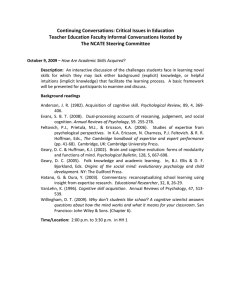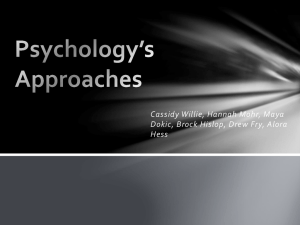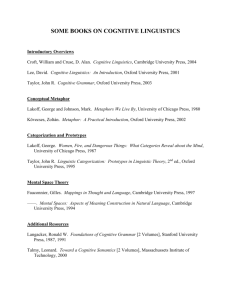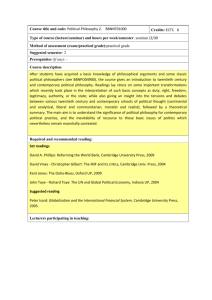Syllabus from
advertisement
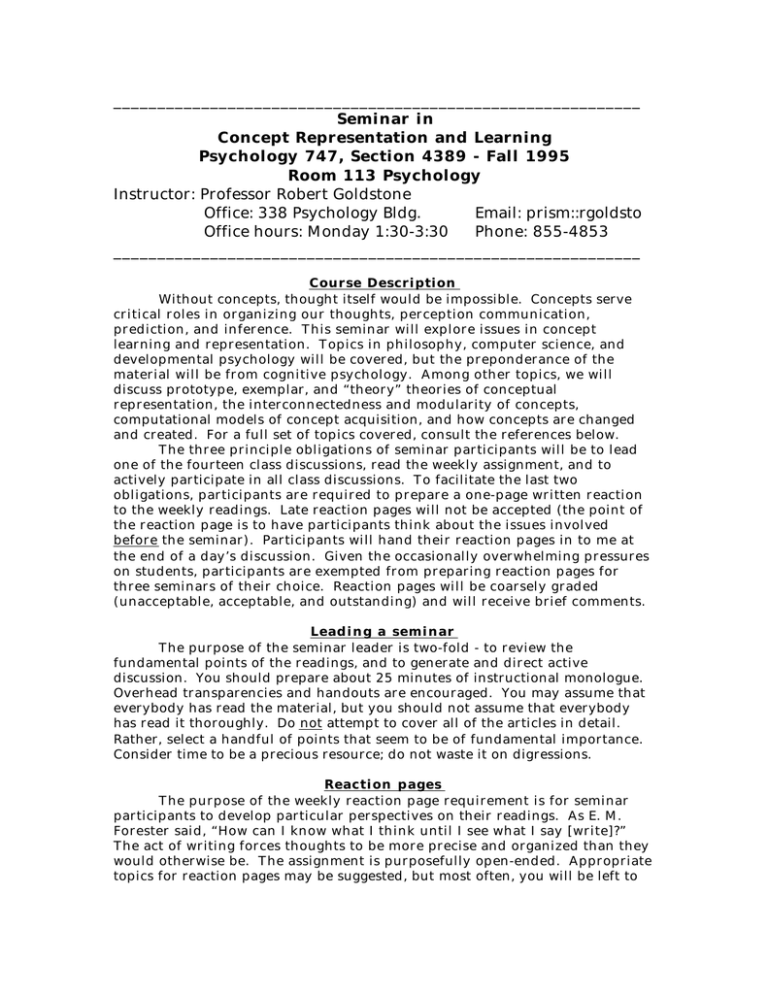
____________________________________________________________ Seminar in Concept Representation and Learning Psychology 747, Section 4389 - Fall 1995 Room 113 Psychology Instructor: Professor Robert Goldstone Office: 338 Psychology Bldg. Email: prism::rgoldsto Office hours: Monday 1:30-3:30 Phone: 855-4853 ____________________________________________________________ Course Description Without concepts, thought itself would be impossible. Concepts serve critical roles in organizing our thoughts, perception communication, prediction, and inference. This seminar will explore issues in concept learning and representation. Topics in philosophy, computer science, and developmental psychology will be covered, but the preponderance of the material will be from cognitive psychology. Among other topics, we will discuss prototype, exemplar, and “theory” theories of conceptual representation, the interconnectedness and modularity of concepts, computational models of concept acquisition, and how concepts are changed and created. For a full set of topics covered, consult the references below. The three principle obligations of seminar participants will be to lead one of the fourteen class discussions, read the weekly assignment, and to actively participate in all class discussions. To facilitate the last two obligations, participants are required to prepare a one-page written reaction to the weekly readings. Late reaction pages will not be accepted (the point of the reaction page is to have participants think about the issues involved before the seminar). Participants will hand their reaction pages in to me at the end of a day’s discussion. Given the occasionally overwhelming pressures on students, participants are exempted from preparing reaction pages for three seminars of their choice. Reaction pages will be coarsely graded (unacceptable, acceptable, and outstanding) and will receive brief comments. Leading a seminar The purpose of the seminar leader is two-fold - to review the fundamental points of the readings, and to generate and direct active discussion. You should prepare about 25 minutes of instructional monologue. Overhead transparencies and handouts are encouraged. You may assume that everybody has read the material, but you should not assume that everybody has read it thoroughly. Do not attempt to cover all of the articles in detail. Rather, select a handful of points that seem to be of fundamental importance. Consider time to be a precious resource; do not waste it on digressions. Reaction pages The purpose of the weekly reaction page requirement is for seminar participants to develop particular perspectives on their readings. As E. M. Forester said, “How can I know what I think until I see what I say [write]?” The act of writing forces thoughts to be more precise and organized than they would otherwise be. The assignment is purposefully open-ended. Appropriate topics for reaction pages may be suggested, but most often, you will be left to select for yourself an interesting topic that relates to the readings in some way. Once again, space should be considered a scarce resource. You should try to be refine your thoughts such that they can be concisely expressed on a single page (I will, however, accept multi-page reactions). The most successful reaction pages focus on a single topic. Resist the temptation to write a few sentences each on four topics. What are appropriate topics for reaction pages? You may develop an experiment that is inspired by one of the readings. Describe the experiment briefly, explain how it bears on relevant theories, and make predictions on the results. You may disagree with a particular claim. Explain why the claim is wrong, and why it is important that it is wrong. You may agree with a claim. Describe extensions to the claim, possible applications, or future directions for research. You may have nothing to say about a particular article. If so, explain why the article is not relevant to fundamental issues of concept learning or representation. Discuss the assumptions of the article, and why you find them inappropriate. Weekly readings Papers are listed in the order you should read them Week 1: Introductions, overview of readings, class policies. Week 2: Reviews of categorization research Komatsu, L. K. (1992). Recent views of conceptual structure. Psychological Bulletin, 112, 500-526. Medin, D. L., & Smith, E. E. (1984). Concepts and concept formation. 35, 113-138. In M. R. Rosenzweig & L. W. Porter (Eds.), Annual review of psychology. Week 3: Prototype theories of concepts Posner, M. I., & Keele, S. W. (1968). On the genesis of abstract idea. Journal of Experimental Psychology, 77, 353-363. Lakoff, G. (1987). Cognitive models and prototype theory. In U. Neisser (Ed.) Concepts and conceptual development. Cambridge University Press: Cambridge. (pp. 63-100). Rosch, E., & Mervis, C. B. (1975). Family resemblance: Studies in the internal structure of categories. Cognitive Psychology, 7, 573-605. Week 4: Exemplar models of concepts Nosofsky, R. M. (1992). Exemplar-based approach to relating categorization, identification, and recognition. in F. G. Ashby (Ed.) Multidimensional Models of Perception and Cognition. Hillsdale, NJ: Lawrence Erlbaum Associates. Kruschke, J. K. (1992). ALCOVE: An exemplar-based connectionist model of category learning. Psychological Review, 99 , 22-44. Week 5: Holistic processing and nonanalytic categorization Kemler Nelson, D. G. (1989). The nature and occurrence of holistic processing. In: B. E. Shepp & S. Ballesteros (Eds.) Object Perception: Structure & Process. (pp. 387-419). Hillsdale, NJ: Erlbaum. Brooks, L. R. (1987). Decentralized control of categorization: The role of prior processing episodes. In U. Neisser (Ed.), Concepts and conceptual development: The ecological and intellectual factors in categorization. (pp. 141-174). Cambridge: Cambridge University Press. Smith, L. B. (1992). A model of perceptual classification in children and adults. Psychological Review, 96 , 125-144. Week 6: “Theory” theories of concepts Murphy, G. L., & Medin. D.L. (1985). The role of theories in conceptual coherence. Psychological Review, 92 , 289-316. Barsalou, L. W. (1983). Ad hoc categories. Memory and Cognition, 11, 211-227. Week 7: Symbol Grounding and Categorization Harnad, S. (1990). The symbol grounding problem. Physica D, 42, 335-346. Medin, D. L., & Barsalou, L. W. (1987). Categorization processes and categorical perception. in S. Harnad (ed.) Categorical perception: The groundwork of cognition. Cambridge: Cambridge University Press. (pp. 455-490). Goldstone, R. L. (1994). The role of similarity in categorization: Providing a groundwork. Cognition, 52, 125-157. Week 8: Modularity and interrelations between concepts Snodgrass, J. G. (1984). Concepts and their Surface Representations. Journal of Verbal Learning and Verbal Behavior, 23 , 3-22. Goldstone, R. L. (1993). Evidence for interrelated and isolated concepts from prototype and caricature classifications. Proceedings of the Fifteenth Annual Conference of the Cognitive Science Society. (pp. 498-503). Hillsdale, NJ: Lawrence Erlbaum Associates. Potts, G. R., St. John, M. F., and Kirson, D. (1989). Incorporating new information into existing world knowledge. Cognitive Psychology, 21, 303333. Week 9: Decomposing concepts Johnson-Laird, P. N. (1983). Mental models. Cambridge, MA: Harvard University Press. Chapter 10. McNamara, T. P., & Miller, D. L. (1989). Attributes of theories of meaning. Psychological Bulletin, 106, 355-376. Week 10: Natural kinds and artifacts Quine, W. V. (1977). Natural Kinds. in S. Schwartz (Ed.) Naming, Necessity, and Natural Kinds. Ithaca: Cornell University Press. (pp 155-175). Markman, E. M. (1989). Categorization and Naming in Children: Problems of Induction. Boston: MIT Press. Chapter 5. Week 11: Connectionist Approaches to Category Construction Rumelhart, D. E., & Zipser, D. (1985). Feature discovery by competitive learning. Cognitive Science, 9, 75-112. Schyns, P. (1991). A modular neural network model of concept acquisition. Cognitive Science, 15, 461-508. Week 12: Creating New Representations for Concepts Matheus, C. J. (1991). The need for constructive induction. In L. Birnbaum and G. Collins (Eds.) Proceedings of the eighth international workshop on Machine Learning. Morgan Kaufmann: San Mateo, CA. Mitchell, M., and Hofstadter, D. R. (1990). The emergence of understanding in a computer model of concepts and analogy-making. Physica D, 42, 322-334. Wisniewski, E. J., & Medin, D. L. (1994). On the interaction of theory and data in concept learning. Cognitive Science, 18, 221-281. Week 13: Conceptual change and development Thagard, P. (1992). Conceptual Revolutions. Princeton University Press: Princeton, NJ. Gholson, B., & Barker, P. (1985). Kuhn, Lakatos, and Laudan. American Psychologist, 40, 755-769. Vosniadu, S., & Brewer, W. F. (1994). Mental models of the day/night cycle. Cognitive Science, 18, 123-183. Week 14: Abstract Concepts and Metaphors Rumelhart, D. E. (1993). Some problems with the notion of literal meaning. in A. Ortony (ed.) Metaphor and thought. Cambridge: Cambridge University Press. (pp. 71-82). Lakoff, G. (1993). The contemporary theory of metaphor. in A. Ortony (ed.) Metaphor and thought. Cambridge: Cambridge University Press. (pp. 202251). Glucksberg, S., & Keysar, B. (1990). Understanding metaphorical comparisons: Beyond similarity. Psychological Review, 97, 3-18. Gibbs, R. W. (1992). Categorization and metaphor understanding. Psychological Review, 99 , 572-577.
